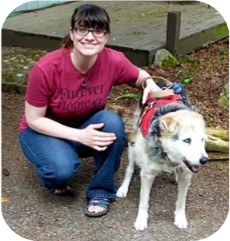A Note on Senior Pet Rescue
by Chelsea Saunders
Note: This month we welcome guest blogger, Chelsea Saunders. Chelsea and her husband Reed have been rescuing senior dogs and cats for years.
Chelsea says: “In the late ‘90’s and early 2000’s I was a very active volunteer with several animal rescue organizations (and even worked at one for a while), and it quickly became apparent that most senior pets relinquished to shelters are doomed to extremely low chances of adoption, long shelter stays, and often wind up leaving this world surrounded by shelter staff rather than family. About fifteen years ago I decided to take in my first senior pet, and I have been doing it ever since. I am lucky enough to have found a husband who shares my heart for animals, and we are committed to doing senior rescue as long as we can. I have taken in 10 seniors cats and dogs, including the two we currently have: our actually quite spry 10-11 year old dog Connor, who we adopted last June, and our sweet as sugar 17 year old cat, Amelia, who we adopted a week before Christmas in 2020.
At this point I think everyone on my friends’ list knows it has been an exceptionally hard year for our family. We have lost five pets in that time—more than we generally have at once. Though I don’t pretend to know what others think, I do have some ideas.
Some might think perhaps the loss of a short-term pet isn’t as hard as the loss of a long-term one. To be brutally honest, it’s the opposite—at least for us. Even though we never get enough time with any of our beloved fur kids, this is especially true with the seniors. And the bond is absolutely as deep—the love is as full and powerful as the love of a long-term pet. The difference is, with long-term pets, you have the luxury of knowing that most (if not all) of their life was good—not perfect, of course, but good. They had love, they had family, they had safety, and they had security. This just isn’t true with most senior rescue situations. So when you grieve for your long-term pets, the grief is yours—you are mourning your loss, your pain. But with the seniors, you have all that, and the tremendous pain of knowing that they did not have the life they deserved, or even close to it. And that stings. It stings a lot.
Some might think that we are foolish for getting so attached to our seniors—we know their time is going to be short, why not think of them more like fosters? Dote on them, sure, but think of them just as transient residents passing through, rather than true family. Why not do that? Because honestly, that’s not the point. Every animal deserves to be family. They deserve that deep, committed love—their bad fortune has already stolen so much from them, it should not steal their ability to experience family too; it should not doom them to only love from a distance.
So knowing that, knowing how much pain we are signing up for every time we welcome a new senior into our home, I am sure a lot of people question why we do it, think of it as a sacrifice, or think “I could never do that!”—even if they find it admirable. But here’s the thing: we don’t do it because we are saints or extra strong or extra loving. It’s purely selfish. Every single senior we have taken in has given us so, so, so, SO much more love than the pain their loss causes. And the love lingers; the pain fades. Getting to watch these creatures learn love, learn comfort, learn to feel worthy and proud. Getting to see health improvements—which almost always happens, even if temporarily—getting to know them, and see the special, unique love that each one has to share…it is everything. Even though I am only 38 I have had the privilege of knowing and loving fifteen animal family members over the years. How lucky am I to be able to say that? Each of them has brought joy, love, lessons, and wisdom. The pain is nothing compared to that.
And the pain does not get easier, but it does get more manageable. It becomes familiar. The feeling of opening the door to the house the first time you know they won’t be waiting on the other side. The feeling of opening the door to the house the first time you forgot they are gone, and get the shock of realizing it. The day after, waking up and reaching for their leash, then remembering. It hurts just the same, but it’s a familiar pain. And you learn your pain process–ok the first day is just going to be shock. The first whole day without them I will be a worthless mess. And so on. So you can anticipate and care for yourself as you need to. And you develop rituals and habits, and the repetition of these through each loss does help with the grief. We go for a very long walk the day they leave. Light a candle all day the whole first month after they are gone. Don’t move their things for a while. We have our ways. As I said—it isn’t easier, but it’s more manageable.
So why do I write all this? Honestly, because I really hope someone might be inspired to take in a senior—even if not habitually like we do. There is such a huge need, and I understand the apprehension. But they are worth it. It is an honor to share the last years or months with a creature, to teach them love and watch them bloom. They are not lucky to have us, we are lucky to have them. I promise.





